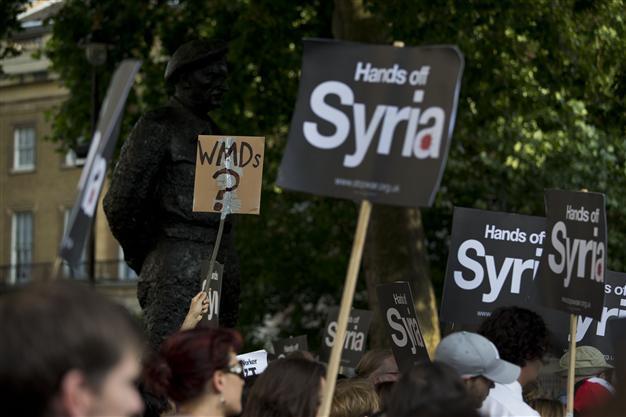US dismisses hope of UN action on Syria
UNITED NATIONS, United States - Agence France-Presse

A placard with the acronym "WMDs?", weapons of mass destruction, is held up during a protest organized by the Stop the War coalition calling for no military attack on Syria from the U.S., Britain or France, in London. AP Photo
The United States on Wednesday ruled out a last-minute bid for UN Security Council action over chemical weapons attacks in Syria, heightening expectations of a Western military strike.
As UN inspectors gather evidence of alleged poison gas attacks near Damascus, world powers have wrangled over the threat of military action against Syrian President Bashar al-Assad.
Syria's nervous neighbors meanwhile stepped up their preparations for conflict as a strike appeared imminent.
Israel authorized a partial call-up of army reservists, Turkey said its forces were on heightened "vigilance," and New York oil hit the highest level -- $112.24 per barrel -- for more than two years.
"The region is like a gunpowder depot," Iran's Supreme Leader Ayatollah Ali Khamenei warned in a condemnation of the West's reported military plans.
Britain proposed a resolution to other UN Security Council permanent members -- the United States, France, Russia and China -- calling for "all necessary measures to protect civilians" in Syria after the alleged chemical weapons attack last week.
The resolution could give a legal basis to any military action.
But the United States quickly dismissed any hope of success because of Russia's staunch opposition to any UN move to pressure the Syrian government, a close ally of Moscow.
"We see no avenue forward, given continued Russian opposition to any meaningful Council action on Syria," State Department deputy spokeswoman Marie Harf said in Washington.
"We cannot be held up in responding by Russia's continued intransigence at the United Nations, and quite frankly the situation is so serious that it demands a response," Harf said.
The spokeswoman said "no decision" had been taken on how to respond to the chemical attack, which if confirmed would be the most deadly use of such weapons since Saddam Hussein gassed Iraqi Kurds in 1988.
But Defense Secretary Chuck Hagel has said American forces are ready to act if President Barack Obama gives the order, and British Prime Minister David Cameron was to make the case for targeted strikes to his country's parliament on Thursday.
A government motion to be voted by the House of Commons, however, says that no measures should be taken until UN inspectors have reported on their investigation in Syria.
The United Nations says the inspection team needs two more days to finish their work. But it has given no deadline for reporting on whether chemical weapons have been used.
The inspectors went to the Ghouta district east of Damascus on Wednesday to collect blood, urine and hair samples from victims of an August 21 attack in which hundreds of people are said to have died.
The United States, Britain and France blame Assad's forces for the attack using chemical weapons, which are banned under an international convention.
The Syrian government has blamed the attack on "terrorist" rebels. Its UN ambassador, Bashar Jaafari, said Wednesday that Syrian soldiers had been gassed in three new incidents near Damascus since last week.
Russia, which has vetoed three UN Security Council resolutions aiming to increase pressure on Assad, has maintained its support for the government. But it also evacuated more than 100 people from the Syrian city of Latakia on Wednesday.
No Syria action before UN inquiry results Russia's Foreign Minister Sergei Lavrov told Britain's Foreign Secretary William Hague that the international community must wait for the UN inquiry to finish before taking any further steps, the Russian Foreign Ministry said.
In another conversation with UN Syria envoy Lakhdar Brahimi, Lavrov said Western military strikes against Assad would destabilize the entire Middle East.
The Syrian government has meanwhile defiantly shrugged off the growing military threat.
Prime Minister Wael al-Halki accused the West of inventing excuses to intervene and warned that the country would become the "graveyard of the invaders." "Western countries, starting with the United States, are inventing fake scenarios and fictitious alibis to intervene militarily in Syria," he was quoted as saying by state television.
UN leader Ban Ki-moon called on the international powers to head off conflict. He said more time must be given to the inspectors and made a new plea for the Security Council to overcome its divisions on Syria.
"Syria is the biggest challenge of war and peace in the world today. The body entrusted with maintaining international peace and security cannot be missing in action," he said.
"The Council must at last find the unity to act. It must use its authority for peace," Ban said.
Ban has been a frequent critic of Assad over the conflict which erupted in March 2011 with anti-regime protests but soon escalated into a full-scale uprising in which more than 100,000 people have died, according to the UN.
